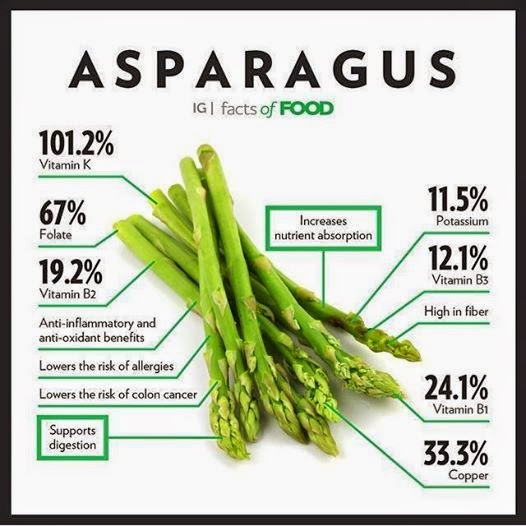How Healthy Is Asparagus? Nutritional Benefits And Health Effects

Table of Contents
The Impressive Nutritional Profile of Asparagus
Asparagus nutrition is surprisingly rich. This low-calorie vegetable is an excellent source of several essential vitamins and minerals, making it a valuable addition to any healthy diet. Understanding its nutritional makeup is key to appreciating its numerous health benefits.
-
Rich in Vitamin K: Asparagus is a standout source of Vitamin K, crucial for blood clotting and maintaining strong, healthy bones. Adequate Vitamin K intake is essential for preventing excessive bleeding and supporting bone mineral density.
-
Excellent source of Folate: This B vitamin is essential for cell growth and development, making asparagus particularly beneficial during pregnancy and for overall cellular health. Folate plays a vital role in preventing neural tube defects in developing fetuses.
-
Good source of Vitamin C: Asparagus provides a decent amount of Vitamin C, a potent antioxidant that strengthens the immune system and protects cells from damage. Vitamin C is also crucial for collagen production, important for skin health and wound healing.
-
Contains Vitamin A: Though not as abundant as in some other vegetables, the Vitamin A in asparagus contributes to good vision and supports immune function. Vitamin A is also important for cell growth and reproduction.
-
Provides significant amounts of fiber: The fiber content in asparagus promotes healthy digestion, prevents constipation, and helps regulate blood sugar levels. Adequate fiber intake is crucial for maintaining a healthy gut microbiome.
-
Contains various minerals: Asparagus is a good source of several essential minerals, including potassium (important for blood pressure regulation), phosphorus (essential for bone health and energy production), and copper (involved in numerous enzymatic processes).
Health Benefits of Asparagus Consumption
The impressive nutrient composition of asparagus translates into a range of potential health benefits, contributing to overall well-being and disease prevention.
-
Antioxidant Properties: Asparagus is rich in antioxidants like glutathione, which help protect cells from damage caused by free radicals. These free radicals contribute to aging and the development of chronic diseases. The antioxidant properties of asparagus help neutralize these harmful molecules, reducing the risk of conditions like heart disease and cancer.
-
Improved Digestive Health: The high fiber content in asparagus aids in digestion and prevents constipation. It adds bulk to the stool, making bowel movements easier and more regular. This also supports a healthy gut microbiome, which is crucial for overall health.
-
Potential Cancer Prevention: Several studies suggest that asparagus may play a role in reducing the risk of certain cancers, due to its high concentration of antioxidants and other beneficial compounds like glutathione and saponins. However, more research is needed to confirm these findings definitively.
-
Blood Pressure Regulation: The potassium content in asparagus may help regulate blood pressure. Potassium helps counterbalance the effects of sodium, contributing to healthier blood pressure levels. This is particularly beneficial for individuals at risk of hypertension.
-
Enhanced Kidney Function: Asparagus can support kidney function by promoting the removal of excess sodium and water from the body. This can be helpful in managing conditions associated with fluid retention.
Asparagus and Weight Management
Asparagus is a low-calorie, high-fiber vegetable, making it an excellent choice for those aiming for weight management. Its high fiber content promotes satiety, keeping you feeling full and satisfied for longer, reducing overall calorie intake. The low-calorie density means you can enjoy a larger serving without significantly impacting your daily calorie goals. Incorporating asparagus into your diet can be a helpful component of a balanced weight loss plan.
Potential Drawbacks and Considerations
While generally safe, there are a few potential drawbacks and considerations regarding asparagus consumption.
-
Allergies: Although rare, asparagus allergies can occur. Symptoms can range from mild skin irritation and itching to more severe reactions, including difficulty breathing or swelling. If you experience any allergic reactions after consuming asparagus, seek immediate medical attention.
-
Medication Interactions: Asparagus may interact with certain medications, particularly those affecting blood clotting or blood pressure. It's crucial to consult with your doctor or pharmacist if you're on any medication before making significant dietary changes, including adding asparagus to your diet regularly.
-
Asparagusic Acid: This compound naturally present in asparagus is responsible for the distinctive odor some individuals experience in their urine after consuming the vegetable. This is a completely harmless effect and not a cause for concern.
Conclusion
Asparagus is undeniably a healthy and delicious addition to a balanced diet. Its rich nutritional profile offers a wealth of potential benefits, from supporting digestive health and boosting the immune system to potentially reducing the risk of chronic diseases. By incorporating this versatile vegetable into your meals regularly, you can harness its nutritional power and contribute to a healthier, more vibrant you. So, start enjoying the numerous benefits of adding more asparagus to your diet today! Explore different ways to prepare this amazing vegetable, from grilling to roasting, and discover its many culinary possibilities while reaping the rewards of its impressive nutritional value. Remember to consult with your doctor or a registered dietitian if you have specific health concerns or dietary restrictions before making significant changes to your diet.

Featured Posts
-
 Home Opener Disappointment Angels Stumble Due To Walks And Injuries
May 01, 2025
Home Opener Disappointment Angels Stumble Due To Walks And Injuries
May 01, 2025 -
 England Edges France In Thrilling Late Game Victory
May 01, 2025
England Edges France In Thrilling Late Game Victory
May 01, 2025 -
 From Hamas Hostage To Time 100 The Noa Argamani Story
May 01, 2025
From Hamas Hostage To Time 100 The Noa Argamani Story
May 01, 2025 -
 Concern In Kashmir Viral Social Media Posts About Cats
May 01, 2025
Concern In Kashmir Viral Social Media Posts About Cats
May 01, 2025 -
 Quick Facts About Michael Jordans Life And Career
May 01, 2025
Quick Facts About Michael Jordans Life And Career
May 01, 2025
Latest Posts
-
 Un Bebe Normand Gagne Son Poids En Chocolat
May 02, 2025
Un Bebe Normand Gagne Son Poids En Chocolat
May 02, 2025 -
 Voici Les Titres Seo Optimises
May 02, 2025
Voici Les Titres Seo Optimises
May 02, 2025 -
 Neispricana Prica Zdravko Colic I Njegova Prva Ljubav
May 02, 2025
Neispricana Prica Zdravko Colic I Njegova Prva Ljubav
May 02, 2025 -
 Zasto Se Udala Razotkrivanje Tajne Iz Zdravkove Pesme Kad Sam Se Vratio
May 02, 2025
Zasto Se Udala Razotkrivanje Tajne Iz Zdravkove Pesme Kad Sam Se Vratio
May 02, 2025 -
 Zaboravljena Prica Zasto Se Udala Prva Ljubav Zdravka Colica
May 02, 2025
Zaboravljena Prica Zasto Se Udala Prva Ljubav Zdravka Colica
May 02, 2025
